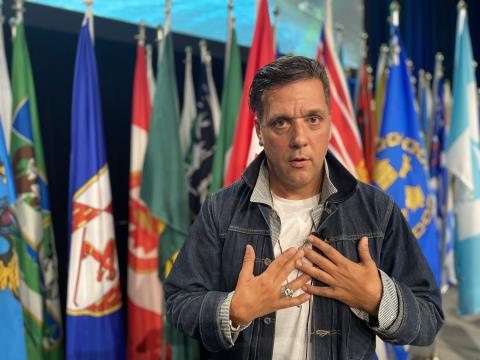5 Minutes With: George Stroumboulopoulos
As someone who listens for a living, we wanted to talk with the 2024 Convention keynote speaker George Stroumboulopoulos about how to hold helpful public discourse in a divided world.
UBCM: The world is fairly polarized right now, especially when we're talking politics. So how do we have constructive, useful conversations?
Stroumboulopoulos: We are no longer in conversations where the common goal is, ‘we want to be okay and move the country forward’. We don't live in that world anymore. There are lots of people who are funded by outside forces. There's dark money, there's the twisted world of social media. There are just some people who just want to watch the world burn. You will never stop that kind of thinking, but you can reduce its impact. Great conversation, great education, things like that make a really big difference. I don't think there's a one size fits all response. I think everybody figures that out in their own little way.
UBCM: Figuring things out individually in our own little ways is kind of perfect for local government and for small communities. Most of BC is made up of small and mid-sized communities. Do you think there's a particular opportunity for smaller communities?
Stroumboulopoulos: I do think the change will happen in smaller communities. It's the same reason why we have a universal health care system in Canada – it started with Tommy Douglas in Weyburn Saskatchewan. And he was able to create the first bill of rights, one that predates the United Nations Bill of Rights. He was the first person, I think, in the country, let women into bars. Saskatchewan has given this country much of what we talk about when we think of the social safety net. It's a pretty conservative place right now, but so much of our social safety net comes from the provincial government in Saskatchewan. And the way Tommy Douglas did it was old fashioned: community after community after community after community. The Winnipeg general strike helped mobilize him, and you had these three young men, boys really, who were killed in a work situation. All these little local things are what created a reality where the country went, ‘We need change. We need to protect the worker.’
So, I do think really local action fixes that locality. And even if that's the most it does, perfect. But I think that good ideas spread. We don’t live in a world anymore where the good idea and the great orator matters – the voter doesn't care about that shit. They know [politicians] are going to say stuff and are just going to vote the party line anyway. But what people do need are solutions to their problems, and that gets fixed locally.
UBCM: Some of what fuels polarized discourse is misinformation, but local elected officials also face a certain degree of naivete about the role of various levels of government. How can they help educate while also combatting vitriol?
Stroumboulopoulos: I see lots of opportunity to come together, but I think also it's going to be very hard for people who work in politics to wrap their heads around this: they are not going to be the solution. They're only going to be part of the solution. It's going to take a long time for this ship to be righted. If you want to fix this in two and a half years, you can’t.
I think the most important thing you can do is teach civics in school properly. Really teach civics. Another thing you can do is show why being honest about the history of the country matters, and why it's not an affront to somebody who doesn't want to hear about it. You have to, over time, show them what are facts and why facts matter. But I mean, that's a 10- 15-year game.
UBCM: How do you see civic engagement and public discourse in light of the polarization we see
Stroumboulopoulos: There's no time in history where we weren't divided and where we weren't at each other's throats. My entire lifetime, it's been a battle. I come from a family below the poverty line and auto workers. Losing jobs is not a new thing. Government not being there for you is not a new thing. If you grow up poor, it's always been this way. I just came back from Pompeii, and you think of the history of Pompeii: Yeah, happened here too. Then you go to LA in the 60s. You go to England in the 70s. So, I'm not sure there's ever been a time that we're going back to. I think we have an opportunity to build a thing, but one thing we have to come to terms with is that there is no yesterday we're trying to recreate.
We're not going back to anything because that thing was never there. The only people who think it was great ‘back then’ were people who weren't poor. So, to me, the only thing that really matters, the real answer to your question is: get people out of poverty. That fixes 90% of the problems in this country. The way this system is set up is that some people think they only benefit when other people are down, that they need the gap. I think if you lift as many people as you can out of poverty, you will see an enormous change, because society will be less susceptible to misinformation, less susceptible to disinformation – and the other people who have held on to so much will realize, oh, they didn't actually lose their way of life. They will not have as much of a need for that kind of manipulation.
And, if it doesn’t fix democracy, at least you're pulling people out of poverty.

